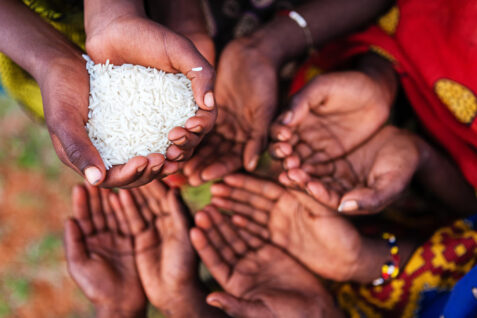A delivery has arrived at Merrueshi Health Centre in Kajiado, Kenya.
It’s a shipment of vital vaccines.
But getting the vials to remote places like this can be tricky. How can they be kept at the correct temperature on the journey when there is no access to electricity?
That’s where the Vaccibox comes in. It’s a solar-powered fridge designed for transporting vaccines to ‘off the grid’ areas.
Rachael Munyau has worked as a nurse at Merrueshi Health Centre for three years.
In the past, she had to use other methods – like a cooler box filled with ice – to take vaccines to remote villages.
But once the ice melted, the temperature inside would rise and spoil the contents.
Now, she uses a Vaccibox.
“It is with this Vaccibox that we have been using to transport vaccines from one facility to another. Like when we go to collect them from the main collection centre, and bring them to the health centre, we use it to store them. The vaccines that are stored there are the vaccines that we use for under-fives; the polio vaccine, the pneumonia vaccine, the measles vaccines, the BCG (Bacillus Calmette–Guérin used to vaccinate against Tuberculosis), the DPT (which vaccinates against diphtheria, whooping cough, and tetanus) and many others even the tetanus toxoid vaccine. It is in the same Vaccibox where we store the COVID-19 vaccine which we use to vaccinate people who come to the facility,” she says.
“And there are times where maybe we are needed maybe to go into the village that there is somebody who couldn’t come to the facility, we use the Vaccibox and a motorbike and transverse our way to the village and vaccinate that person.”
Electricity connection has remained a challenge in developing countries, especially in Africa.
It makes the transportation of perishable goods – like vaccines – difficult.
It was this problem that inspired Norah Magero to invent the Vaccibox.
She’s an engineer and the CEO of Drop Access, an organization that specialises in finding sustainable solutions for supporting rural and off-grid communities in Kenya.
Initially, she was approached by a group of dairy farmers who were looking for a solution to transport their milk to the market without it going bad.
When the COVID-19 pandemic hit she realised that the refrigerator could also be used to transport vaccines.
“Vaccibox is a portable fridge, it is 20kg in weight, and 40 litres in capacity and it is so portable that you can mount it on a motorbike, a bicycle or even a boat or even carry it. And beyond portability, it is solar-powered and it’s integrated with a battery back-up just to ensure that even during the night, and times of very little sun, the fridge is still able to continue operating to keep vaccines cold,” she says.
“And it comes as a whole package solution because it is integrated with an online monitoring capability where we are able to know at any one point where the location of the fridge, the location of the vaccines and also what temperature the vaccines are being stored for, just to ensure traceability of these vaccines.”
The fridge also has a USB port for charging devices like mobile phones.
It is big enough to hold at least 3,000 vaccination doses, which can be life-saving for a clinic in a small village.
It takes up to two hours to fully charge and can retain power for a maximum of nine hours.
“Very important to monitor the temperature at which vaccines are stored at any one point without missing an opportunity because if it is not monitored it means the temperature could spike rendering the vaccines non-viable and when it is not noticed there is a possibility that a child can get that vaccine that has no potency or very little efficacy – they get a placebo. And that is a missed opportunity for quality healthcare and complete vaccination of a child,” says Magero.
Julius Oyugi is a virologist and a professor at the University of Nairobi.
He says the Vaccibox is a useful tool for keeping vaccines at the correct temperature.
“The fact that it maintains the temperatures between 2-10 (Celsius) means that it actually maintains the temperature required to transport vaccines, such as AstraZeneca, for the required period. I understand that it can maintain the temperature for up to nine hours and that is long enough to transport vaccines from one region to another, especially in remote regions of this country,” he says.
The Vaccibox will help save lives by ensuring that the vaccines reach their intended destinations in a viable condition.
For remote communities, it could be the answer to getting vaccinated against coronavirus.

























